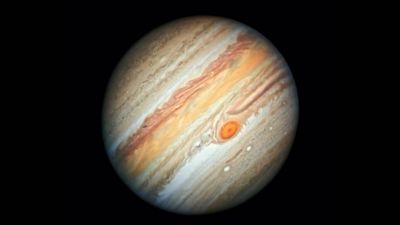'Juice' spacecraft launch to explore Jupiter's moons postponed over lightning risk

The launch of a spacecraft bound for Jupiter's moons has been halted for the day over fears of lightning strikes and adverse weather conditions.
Juice, which stands for JUpiter ICy moons Explorer, was due to blast off on April 13 from French Guiana to begin its eight-year journey.
The spacecraft will be the first ever to orbit a moon other than our own - Jupiter's largest moon Ganymede.
But that journey will have to wait at least another day, with the European Space Agency (ESA) believed to be planning another attempt on Friday at 1.14pm, weather permitting.
What are the aims of the mission?
Scientists hope that Juice will be able to improve their understanding as to whether any of Jupiter's three ocean-bearing moons can support life.
They plan to gain information by utilising ten instruments built into the spacecraft, including one which was developed by experts from Imperial College London.
The instrument, known as J-MAG, will measure the characteristics of the magnetic fields of Jupiter and its largest moon, Ganymede.
In addition, the mangnetometer will play a key role in detecting moving salts in the oceans beneath the icy crusts of Ganymede, as well as exploring Jupiter's other moons - Europa and Callisto.
The data will help characterise the depth and salt content of Ganymede's ocean, to see if it may hold the conditions for life.
Professor Michele Dougherty, head of the Department of Physics at Imperial College London and principal investigator for J-MAG, said: "What we're doing however is extremely difficult, as the signals we're trying to detect are extremely small.
"It's like trying to find lots of needles in a haystack, and those needles are changing shape and colour all the time.
"But we think the results are going to be spectacular."
Professor Dougherty and her team will be collaborating with experts from the University of Leicester as well as the University College London (UCL).
Leicester's scientists have also collaborated with other experts on two other instruments on Juice.
These include the MAJIS (the Moons and Jupiter Imaging Spectrometer), which will observe cloud features and atmospheric constituents on Jupiter, and UVS (UV imaging spectrograph). The MAJIS will also characterise the composition and dynamics of the exospheres of the icy moons.
Meanwhile, the UCL's Mullard Space Science Laboratory (MSSL) has provided particle detectors for Juice's PEP (Particle Environment Package) instrument.
The PEP will gather data on "the 'soup' of ions, electrons, and atoms surrounding Jupiter and its moons".
Professor Geraint Jones, of MSSL and a co-investigator on the PEP instrument, said: "We are excited that the mission will shed new light on worlds that could potentially host life."
Want a quick and expert briefing on the biggest news stories? Listen to our latest podcasts to find out What You Need To Know.